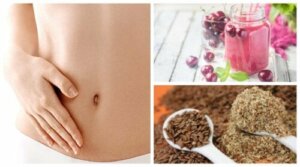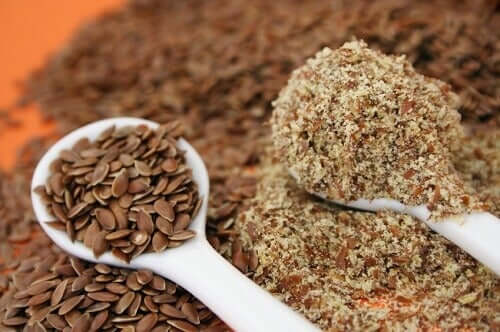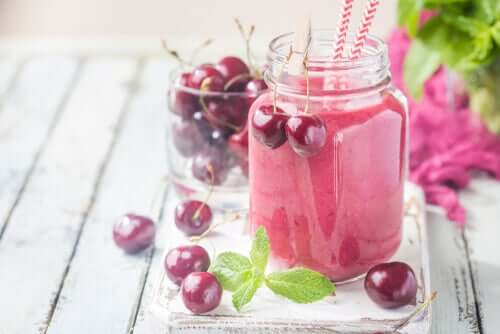12 Foods that Help Prevent Bloating


Reviewed and approved by the nutritionist Maria Patricia Pinero Corredor
Foods that help prevent bloating can relieve this discomfort, in addition to the feeling of heaviness and fullness that can accompany it.
Bloating is usually related to eating too much. However, it can also be due to the accumulation of liquids and gases. Another source of bloating may be digestive problems. These include gastritis and constipation.
Fortunately, there are some foods that help prevent bloating and fight swelling in general. Keep on reading to find out which ones you can use.
What you eat affects you
Although they can be a great support, keep in mind that, to reduce bloating, you shouldn’t only try to improve your lifestyle habits but also pay more attention to what you eat every day so you don’t fall into the same problem over and over again.
Don’t forget that something as simple as avoiding big meals rich in simple sugars or fats can greatly improve your digestive health. These foods can also cause flatulence. Therefore, we advise reducing their consumption.
Of course, don’t forget that, if you have a few extra pounds and the fat is located in your abdomen, it’s best for you to follow a specific diet. This way, you can eliminate excess fat and enjoy a flat and healthy abdomen. You should see a specialist for this.
Foods that help prevent bloating
Foods to reduce bloating are rich in both water and fiber. Therefore, they facilitate intestinal transit and improve discomfort. On the other hand, they can contain several healthy nutrients, such as vitamins and minerals.
1. Flax seed

Foods that have omega-3 fatty acids and prostaglandins are the some of the best around to help reduce bloating. Flax, also called linseed, is a food rich in healthy fats. These help your body regulate inflammation.
The best way to prepare them is to let them soak in water for several hours. When they’re ready, put them in a yogurt, smoothie, or salad.
2. Blueberries to help prevent bloating
Blueberries are another food that can relieve the retention of liquids and help prevent bloating. This is because they’re rich in flavonoids. Not only that, but they also have antioxidant and anti-inflammatory properties. These help to control free radicals.
3. Cherries

Even though it may not seem like it, cherries can become one of your greatest allies in your fight against bloating. They contain antioxidants and small amounts of magnesium, iron, vitamin C, provitamin A, thiamine, and folate.
This article may interest you: Blueberry and Cherry Antioxidant Smoothie
4. Curry
Curry, as a salt and spice substitute, can season the foods that help reduce bloating.
5. Green tea to help prevent bloating
Green tea has proven diuretic properties. This tea is also rich in antioxidants. If you’re bloated, it’s better to choose a cup of green tea than to drink black tea or other drinks like coffee.
Discover: What Happens to Your Body if You Drink Green Tea Every Day?
6. Bananas
You should eat bananas if you have swelling or bloating caused by liquid retention. The potassium in bananas can be of great help. If you eat something salty at night, it’s good to eat a banana for breakfast. As you know, salt makes your body retain liquids. Thus, avoid using extra salt on your foods.
7. Avocado
Avocado is one of the recommended foods if you’re looking to lose weight because it contains healthy fats. Olive oil, almonds, and unsalted pistachios can also help in this regard.
8. Papaya to help prevent bloating
Papaya is rich in carotenoids. In addition, it contains an active substance called papain, which is considered similar to pepsin found in the gastric cavity, so it can help prevent bloating.
It’s also good for treating constipation. So, cut some up into squares and eat it after meals: a delicious natural dessert. If you’re going to make it in smoothies, don’t add any sugar.
9. Pineapple
Bromelain is an enzyme found in pineapples. It fulfills a similar function to pepsin with respect to amino acids; thus, it helps in the digestion of proteins. And therefore, it can make meals such as meat or fish not so heavy.
10. Chamomile
A cup of hot chamomile doesn’t just relax you after a long day, but it can also relieve stomach discomfort, due to its carminative properties, helping reduce gas and bloating.
11. Ginger to help prevent bloating
To prevent gas and bloating, try chewing a small piece of ginger (the size of your little fingernail) after meals.
Or if you prefer, prepare a very simple infusion: a cup of hot water, a tablespoon of grated ginger, and the juice of half a lemon. It’s good for your stomach and your throat.
12. Lactose-free milk
Milk is one of the other foods that can make you feel bloated. This is because of the lactose it contains. This is especially true with people who have problems digesting it.
For this reason, there’s nothing better than adding broken-down lactose (for example, yogurt) to your diet. Afterward, you can add milk in small amounts.
Maintain healthy eating habits
To reduce bloating, in addition to including the aforementioned foods in your diet (always in moderation), remember you must maintain good eating habits, which include:
- Chew your food slowly at each meal
- Eat calmly and sitting down (especially in the three main meals of the day)
- Rest for at least 15 minutes after each main meal (never lying down but sitting or slightly reclining)
- Avoid drinking a lot of fluids while you eat, as this contributes to bloating and heavy digestion
- Avoid eating fried foods, industrial products, and ultra-processed foods, as they don’t contribute to your health and cause bloating and heaviness
Enjoy eating and avoid bloating
Keep in mind that you need to dedicate the necessary time to eating to be able to avoid experience discomfort, such as bloating or stomach heaviness.
So, don’t rush! But, in case the problems persist or the swelling is accompanied by other symptoms, such as pain and nausea, you should see a doctor.
All cited sources were thoroughly reviewed by our team to ensure their quality, reliability, currency, and validity. The bibliography of this article was considered reliable and of academic or scientific accuracy.
- Aguilera M, Reza M, Chew R, et al. (2011). Propiedades funcionales de las antocianinas. Revista Biotecnia. 13. 16-22. Disponible en: https://biotecnia.unison.mx/index.php/biotecnia/article/view/81
- Castro M. (2002). Ácidos grasos omega 3: beneficios y fuentes. Interciencia, 27(3), 128-136. Disponible en: https://www.redalyc.org/pdf/339/33906605.pdf
- Chandrika U, Jansz E, Wickramasinghe S, et al. (2003). Carotenoids in yellow- and red-fleshed papaya (Carica papaya L). J. Sci. Food Agric., 83: 1279-1282. Disponible en: https://www.researchgate.net/publication/229493669_Carotenoids_in_yellow-_and_red-fleshed_papaya_Carica_papaya_L
- Cosavalente K, Ganoza S, Ganoza M. (2016). Antocianinas totales y capacidad antioxidante in vitro de extractos de diferente grado etanólico del fruto de Vacciniumcorymbosum “Arándano”. UCV-Scientia, 8(1), 44–48. Disponible en: https://doi.org/10.18050/RevUcv-Scientia.v8n1a5
- Domínguez D. (2010). Nutrición y ejercicio. Endocrinología y Nutrición. Disponible en: https://www.portalesmedicos.com/publicaciones/articles/2019/1/Nutricion-y-ejercicio.html
- Meza E, Núñez B, Maldonado O. (2018). Evaluación de la composición nutricional de alimentos procesados y ultraprocesados de acuerdo al perfil de alimentos de la Organización Panamericana de la Salud, con énfasis en nutrientes críticos. Memorias del Instituto de Investigaciones de Ciencias de la Salud; Vol. 16(1). Disponible en: http://archivo.bc.una.py/index.php/RIIC/article/view/1332
- Meza L, Dicovskiy L. (2020). Uso potencial de la manzanilla matricaria chamomilla l. y experiencias en Nicaragua. Revista Ciencia Y Tecnología El Higo, 10(1), 1–8. Disponible en: https://doi.org/10.5377/elhigo.v10i1.9927
- Moreira V, López A. (2006). Intolerancia a la lactosa. Revista Española de Enfermedades Digestivas. (Madrid); Vol. 98. N.° 2, pp. 143. Disponible en: https://scielo.isciii.es/scielo.php?script=sci_arttext&pid=S1130-01082006000200009
- Nih.gov. (Nov 2022). Ácidos grasos omega-3. Disponible en: https://ods.od.nih.gov/factsheets/Omega3FattyAcids-DatosEnEspanol/
- Paradis M, Couture P, Gigleux I, et al. (2015). Impact of systemic enzyme supplementation on low-grade inflammation in humans. Pharma Nutrition, 3(3), 83-88. Disponible en: https://www.sciencedirect.com/science/article/pii/S2213434415000195
- Vázquez L, López P, López A, et al. (2017). Efectos del té verde y su contenido de galato de epigalocatequina (EGCG) sobre el peso corporal y la masa grasa en humanos. Una revisión sistemática. Nutrición Hospitalaria, 34(3), 731-737 Disponible en: https://scielo.isciii.es/scielo.php?pid=S0212-16112017000300731&script=sci_arttext&tlng=pt
This text is provided for informational purposes only and does not replace consultation with a professional. If in doubt, consult your specialist.








